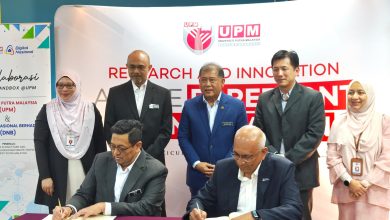Global Sustainability Barometer: ASEAN Trails Global Average in Sustainability
72% of ASEAN Businesses Have Not Fully Leveraged Their Technology to Achieve Sustainability Goals

Kyndryl, the world’s largest IT infrastructure services provider, released the second Global Sustainability Barometer study, commissioned by Microsoft. The Global Sustainability Barometer study, conducted by Ecosystm, shows that while 72% of ASEAN organisations place high strategic importance on achieving sustainability goals, only 28% report they fully utilise technology to its fullest potential informing their overall sustainability strategy.
Since last year, 26% of organisations in ASEAN have increased their sustainability goals and program execution—demonstrating progress across the region as the world works toward a green future. The Global Sustainability Barometer study found that amongst ASEAN countries, there are marked differences with 32% of companies in Singapore and Thailand having increased their sustainability goals and program execution year-on-year, compared to 23% in the Philippines and 17% in Malaysia.
“As the world faces increasing climate-related challenges, businesses across ASEAN are under pressure to act decisively and place sustainability at the forefront. This year’s Global Sustainability Barometer study, which also features in-depth analysis of several countries in ASEAN, highlights that organisations must move from intent to collective action to drive change,” said Andrew Lim, Managing Director at Kyndryl ASEAN. “Businesses leaders across the region recognise the need for importance of sustainability for their organisation, but face challenges with implementing it across all processes and systems. Technology can help drive insights and optimisation opportunities, driving real, positive change.”
The Global Sustainability Barometer study shows that leaders in ASEAN increasingly recognise the benefits of sustainability initiatives for their organizations, with specific areas where improvements can be made. Organisations can turn abstract goals into actionable, data-driven plans by embedding technology into sustainability strategies.
Highlights of the Global Sustainability Barometer Study
The Global Sustainability Barometer study highlights several areas of opportunity ASEAN businesses can explore:
- Only 22% of organisations recognise technology’s dual role in reducing their company’s carbon footprints and advancing broader sustainability goals, with technology teams primarily focusing on reducing their own environmental impact through increased server virtualisation ratios or tracking IT operations emissions.
- While 75% of businesses say sustainability goals and initiatives are incorporated into existing reporting processes, only 4% fully use data for strategic planning and decision-making.
- 37% believe Artificial Intelligence (AI) will significantly impact their sustainability goals, but 54% of organisations face challenges measuring the environmental impact of AI.
Matthew Sekol, a Sustainability Global Black Belt at Microsoft, added, “Companies can gain the insights needed to deliver on their commitments and drive resilience by integrating sustainability data with operational and financial data, and using traditional data analytics and robust AI tooling to reshape operational efficiencies and foster sustainable innovations.”
Taking Action to Advance Sustainability Strategies
The Global Sustainability Barometer study’s detailed analysis and deep insights can enable organizations across ASEAN to enhance their sustainability efforts. To fully realise an organization’s potential, consider the following guiding principles:
- Technology must be core to strategic planning. 60% of organisations either neglect to use technology for sustainability or limit its application to reducing the carbon footprint of their infrastructure and operations. In the next year, companies should consider integrating technology into sustainability strategies to turn abstract goals into actionable plans.
- Recast the role of AI. 54% of organisations shared that their key challenge was measuring the environmental impact of AI when integrating AI for sustainability initiatives, while 45% used AI to predict and prepare for natural disasters. Integrating AI-powered scenario planning and climate risk mitigation allows organisations to adopt a holistic approach to environmental responsibility, enhancing readiness for future challenges.
- Customer demands for sustainability. 36% of organisations reported that customers demand sustainable products as a main driver of sustainability initiatives. And yet, 38% of organisations report not enough buy in / support from their leadership team. Business leaders should recognise that many stakeholders, including supply chain partners, government, and regulators, are actively advocating for sustainability policies.
- Foster a culture of collective responsibility. Legal and risk teams shape sustainability vision and goals, followed by Operations and the CEO. The next step is for organisations to fully engage cross-functional teams, particularly finance and technology, to move sustainability into a core business priority and ensure implementation.
While the benefit of AI for sustainability is gaining traction, AI’s environmental impact is a growing concern. According to the Global Sustainability Barometer study, only 23% of organisations are considering the environmental implications of their AI solutions. Kyndryl and Microsoft provide actionable strategies for organisations to measure infrastructure baseline emissions and optimize AI architectures, including AI and machine learning models to minimise energy use and reduce waste. The two companies work closely with organisations to ensure that technological advancements contribute positively to sustainability goals without compromising innovation.
“We are witnessing a growing number of ASEAN organisations, especially large corporations and conglomerates, prioritising sustainability as a strategic imperative,” said Ullrich Loeffler, CEO and Co-Founder of Ecosystm. “AI is playing a pivotal role in these initiatives, enabling businesses to optimise resource consumption, reduce waste, and drive positive environmental impact. This trend is poised to ripple through the broader ASEAN market, fostering a collaborative ecosystem that will create a more sustainable and equitable future for generations to come.”
About the Global Sustainability Barometer Study
The second edition of the Global Sustainability Barometer study, conducted by Ecosystm and commissioned by Kyndryl and Microsoft, reflects the perspectives of 1,355 global sustainability leaders spanning 20 countries and 9 industry groups. Conducted between August and September 2024, this study aims to bridge the sustainability-technology divide by examining the roles of strategy, data, and AI in achieving sustainability goals.
Learn more about the study, “From Insights to Action: The Technology Impact on Sustainability.”




